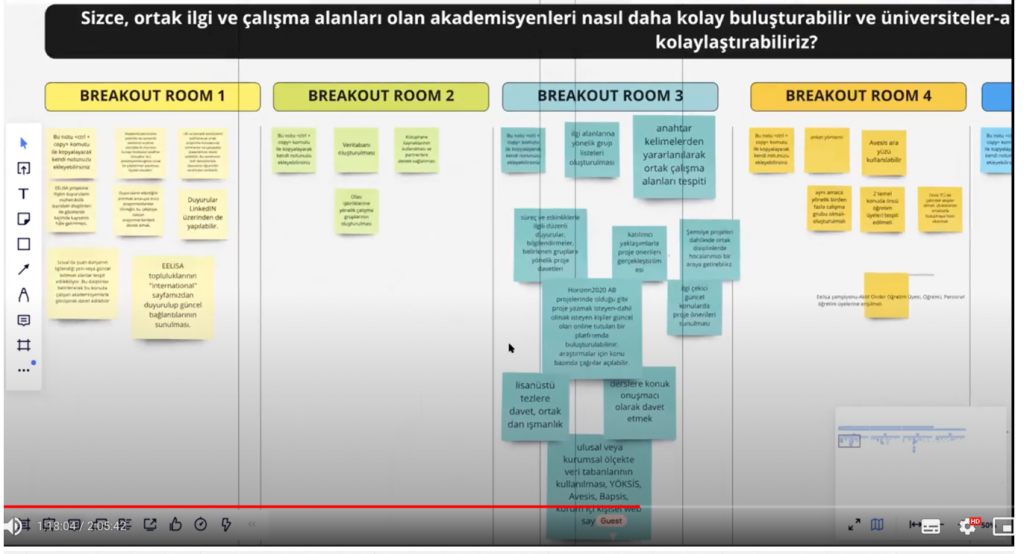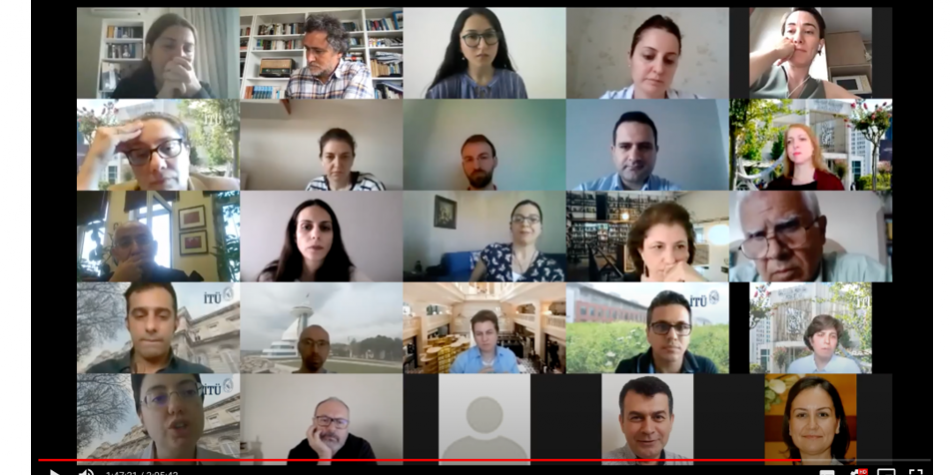Istanbul Technical University (ITU) organized the second kick-off workshop on EELISA communities on Tuesday, 18th May 2021. The target audience of the workshop, a first of a series of events to build awareness on EELISA communities at ITU, included academics and researchers. Approximately 60 participants from various disciplines attended the 3-hour session to brainstorm on how the creation of the EELISA communities could be facilitated as an essential and innovative component of a European University vision.
Following the opening speech made by Lütfiye Durak Ata, Vice Rector of ITU for International Affairs, the introductory session hosted Sofia d’Aguiar, Executive Director of the EELISA, Eike Trost, Work Package leader for EELISA Communities and María Angeles Huerta, UPM´s Academic Coordinator for EELISA.
“We are facing a systemic transformation¨
In her keynote speech, Sofia d’Aguiar highlighted the dynamic nature of the EELISA initiative as a challenge for transforming higher education in a systemic and sustainable manner by empowering European universities.¨ As a member of the EELISA Alliance, this is a great opportunity for ITU to be part of a process that aims to transform engineering education and society.”. Sofía d’Aguiar underlined the three core elements of EELISA: the EELISA Credencial, the EELISA Degree, and the EELISA Diploma Supplement. She concluded her speech by pointing out the cross-border opportunities offered by EELISA to academics and researchers to engage students in new and innovative ways in multidisciplinary and diverse environments, boost the possibilities to academic work dissemination in international platforms, and strengthen the links between STEM and society.
“Digitalization opens new avenues”
Eike Trost, started her presentation by clarifying the ‘EELISA Community’ concept. She explained the role of Communities in fulfilling the mission of the EELISA Alliance to create impact, and provided a brief summary of the works achieved so far, since the beginning of the project. Trost highlighted the ongoing digitization process in the higher education system, and recalled that several students from partner institutions had joined FAU’s hackathon in the previous weeks. “It is great to see that local things become national and international¨, she added. Eike Trost also underlined that the Innovation and Networking Platform for EELISA Communities will be set up soon, to facilitate the co-creation of virtual communities where interdisciplinary teams can meet and exchange ideas, and make activities visible and accessible to everyone.
“Open and collaborative, not competitive”
María Angeles Huerta summarized the 2.5-month process and the roadmap at EELISA partner institution UPM. A process that was concieved to find motivated and engaged faculty and staff with an interest to get involved in the EELISA Alliance. “Using the aggregate intelligence of very talented people within our organizations should always be our target,” Huerta added. She also gave information about the 17 pioneer communities launched by UPM and highlighted the dynamic nature of the process, “ We need to follow open, collaborative approaches, especially when there are more questions than answers.”

The second part of the workshop started with a summary of the activities presented by Emrah Acar, regarding EELISA Communities at ITU. Acar continued with an explanation of the sessions format and its interactive flow. Based on the contextual background provided in the first session, the interactive discussions sought answers to 3 main questions:
- How can we bring together academics with shared interests from partner institutions to facilitate the creation of EELISA Communities?
- What incentives can be used for academics to facilitate the creation of the EELISA Communities?
- Which support mechanisms can be created / used within ITU to support academics that take on roles in EELISA Communities?
Attendees from various departments were split into interdisciplinary groups using Zoom’s breakout rooms, where they first shared their views individually by posting sticky notes on the common Miro Board. Interactive discussions were carried out in each room to exchange alternative perspectives, after which the representatives of each group summarized the outcomes of their internal discussions.
Once more, the ITU workshop was an opportunity to engage with academics and researchers, and to obtain their valuable feedback on an interactive platform – like a big open canvas where everyone´s brushstroke is important.

